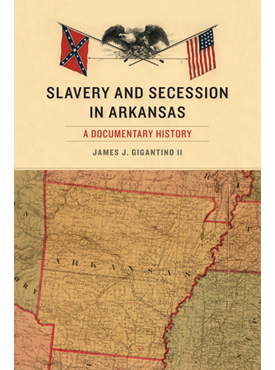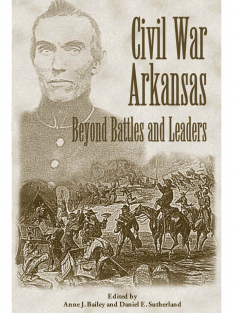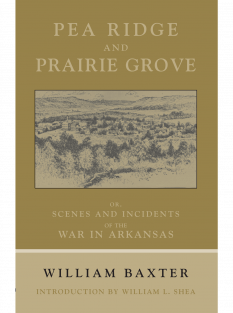2016 Choice Outstanding Academic Title
The absorbing documents collected in Slavery and Secession in Arkansas trace Arkansas’s tortuous road to secession and war. Drawn from contemporary pamphlets, broadsides, legislative debates, public addresses, newspapers, and private correspondence, these accounts show the intricate twists and turns of the political drama in Arkansas between early 1859 and the summer of 1861. From an early warning of what Republican political dominance would mean for the South, through the initial rejection of secession, to Arkansas’s final abandonment of the Union, readers, even while knowing the eventual outcome, will find the journey both suspenseful and informative.
Revealing both the unique features of the secession story in Arkansas and the issues that Arkansas shared with much of the rest of the South, this collection illustrates how Arkansans debated their place in the nation and, specifically, how the defense of slavery—as both an assurance of continued economic progress and a means of social control—remained central to the decision to leave the Union and fight alongside much of the South for four bloody years of civil war.
James J. Gigantino teaches in the history department at the University of Arkansas.
“Every student of Arkansas history — and anyone interested in sectional conflict and the Civil War more generally — will welcome Slavery and Secession in Arkansas: A Documentary History… This superb anthology doesn’t cherry-pick but instead offers readers the entire tree, with generous excerpts of speeches, debates, newspaper commentary, and private correspondence bearing on Arkansas’s decision to secede. The collection begins with a speech Rep. Thomas Hindman delivered in Little Rock in February 1859 and ends with a Searcy County delegate’s account of the secession convention taking the state our of the union on May 6, 1861. All sides are heard from as Arkansas debates, hesitates, and then takes the plunge. It will shock few readers of this journal that slavery—and not something more abstract or less momentous—was at the center of the discussion. But many might be surprised to find Arkansas secessionists adamantly opposing states’ rights. What seemed to concern a lot of them was defending their federally guaranteed right to the return of fugitive slaves against ‘nullification’ by northern states’ personal liberty laws. The volume’s source material is accompanied by an introduction, commentary, and expert annotations by Gigantino…”
—Arkansas Historical Quarterly, Summer 2016
“With renewed public interest in the causes of Southern secession, this illuminating book will certainly find an audience among those interested in an honest accounting of the past, and in letting long-departed voices speak as to their own motivations.
Highly recommended. Undergraduates through faculty/researchers; professionals/practitioners; general readers.”
—Choice

“The Civil War in the West has a single goal: to promote historical writing about the war in the western states and territories. It focuses most particularly on the Trans-Mississippi theater, which consisted of Missouri, Arkansas, Texas, most of Louisiana (west of the Mississippi River), Indian Territory (modern day Oklahoma), and Arizona Territory (two-fifths of modern day Arizona and New Mexico) but encompasses adjacent states, such as Kansas, Tennessee, and Mississippi, that directly influenced the Trans-Mississippi war. It is a wide swath, to be sure, but one too often ignored by historians and, consequently, too little understood and appreciated.
Topically, the series embraces all aspects of the wartime story. Military history in its many guises, from the strategies of generals to the daily lives of common soldiers, forms an important part of that story, but so, too, do the numerous and complex political, economic, social, and diplomatic dimensions of the war. The series also provides a variety of perspectives on these topics. Most importantly, it offers the best in modern scholarship, with thoughtful, challenging monographs.
Secondly, it presents new editions of important books that have gone out of print. And thirdly, it premieres expertly edited correspondence, diaries, reminiscences, and other writings by participants in the war. It is a formidable challenge, but by focusing on some of the least familiar dimensions of the conflict, The Civil War in the West significantly broadens our understanding of the nation’s most pivotal and dramatic story.”
—Daniel Sutherland, from the preface of I Do Wish This Cruel War Was Over





